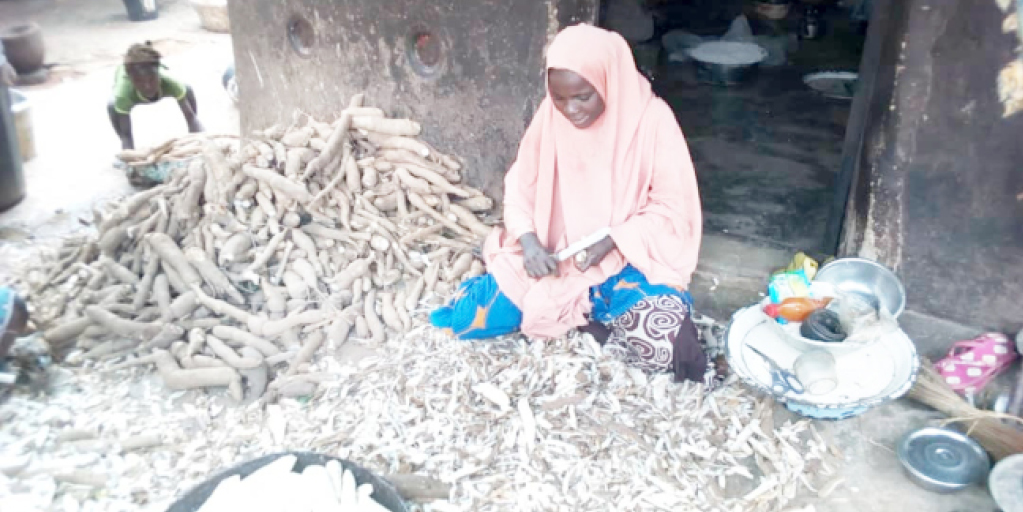How beneficiaries of Conditional Cash Transfer invested in Niger
Some women who benefitted from the federal government’s conditional Cash Transfer scheme are investing the money to support their families through small businesses. Daily Trust on Sunday reports Some of these beneficiaries said they did not have any business before the intervention by the federal government, which was targeted at the vulnerable. A total of […]

A beneficiary into Gari business
Some women who benefitted from the federal government’s conditional Cash Transfer scheme are investing the money to support their families through small businesses. Daily Trust on Sunday reports
Some of these beneficiaries said they did not have any business before the intervention by the federal government, which was targeted at the vulnerable.
A total of 80,895 people from 2,421 communities in the 25 local government areas of the state were said to have benefitted from the programme since 2016.
The head of operation, Niger State Cash Transfer Unit, Suleiman Hussaini Kpange, said the process had been digitalised to make the disbursement easy and faster, as well as save disbursement officials and the beneficiaries from security attacks associated with the movement of cash.
“The beneficiaries now collect their stipends at their own convenience, whether they have an account number or not. A wallet has been created for them. This wallet is where each beneficiary will now access his or her money at her convenient time,” he said.
He said a monthly stipend of N5,000 was given to households in poverty-stricken communities, with an additional N5,000 for families designated as priorities or extreme cases, on a monthly basis.
He noted that aside the cash transfers, as part of the programme, beneficiaries were supported, trained and monitored by trained community facilitators, who visit them regularly to help them take ownership of their lives.
One of the requirements was that households with school aged children would enroll them in school to promote education.
The head of the Niger State Household Uplifting Programme and Cash Transfer, Hadiza Mohammed Shiru, said the payments were made in line with prescribed guidelines.
She appreciated the federal, state and local governments and traditional institutions in the state for the roles they played, beginning from the enrollment stage.
Some of the beneficiaries interviewed by our correspondent confirmed the disbursement of the stipends and said that apart from going into individual businesses, they also opened cooperative groups, through which they contribute and save money, which is given as loans to members.
Habiba Ibrahim said, “Immediately I started receiving the stipends, I opened a shop to start selling provisions. This shop has now become my source of livelihood. I help my family from the profits I make.”
Salamatu Garba from Gawu ward in Gurara Local Government Area also told Daily Trust on Sunday that she started her kuli-kuli business through the money she got from the cash transfer scheme, and the business has helped her contribute to the education of her children.
Similarly, Huraira Haruna Manta said, “They didn’t give me cash. I was asked to open an account, which I did. All the payments were made directly into my account.
“Before I started receiving the money, I was not into any business. I have started a catering business, which I had learned but could not start due to lack of capital.”
Habiba, another beneficiary at Chanchaga, thanked the federal government for introducing the programme, saying that with the money she got for six months, she was able to pay the school fees of seven orphans under her care, and used part of it in buying and selling melon and other farm produce, which has assisted her in feeding her family.
Also, Fatima Mohammed said the money had helped her go for some medical checkups she had not been able to attend due to lack of money.
She further said, “I have started sachet water business with the money. I am a widow with seven children under me. This money has helped to sustain us.”
Maryam Abubakar also told our correspondent that her initial payments were N20,000 and N10,000, which she used to start a business of farm produce.
Furthermore, Zainab Salihu Lemu, a beneficiary from Gbako Local Government Area, said she also used the money she got from the federal government’s cash transfer to buy farm produce for future use, noting, “This money is helping me because I don’t wait for my husband to do everything for me again. I am into buying and selling.”
